Putin's Russia: Do Russians care what president does next?
- Published
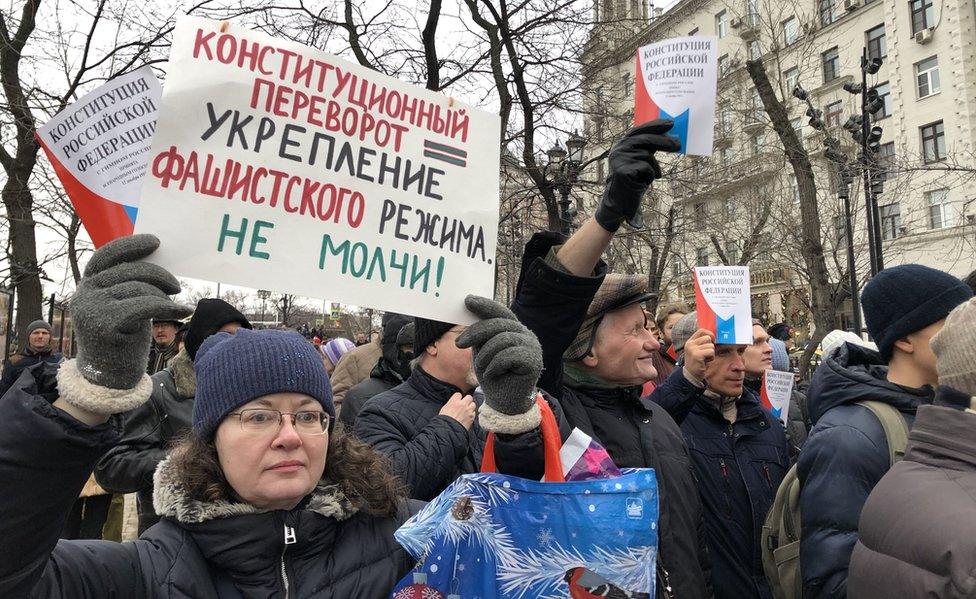
Several cities have seen protests and this banner warns of a "constitutional coup" but not all Russians are so concerned
Two weeks after Vladimir Putin announced a radical overhaul of the constitution, loyal officials in Moscow have been moving at lighting speed to implement his changes.
Deputies in parliament have already passed the amendments in a first reading even as protesters insist the move is a smokescreen to allow Mr Putin to retain influence, or even power, beyond 2024, when he is due to step down as president.
But as analysts argue over his real intentions, just a short drive from the capital many people are either unaware of what's happening or indifferent.
At the entrance to Pereslavl-Zalessky, there's a giant Soviet hammer and sickle by the side of the road that it seems no-one ever bothered to remove.
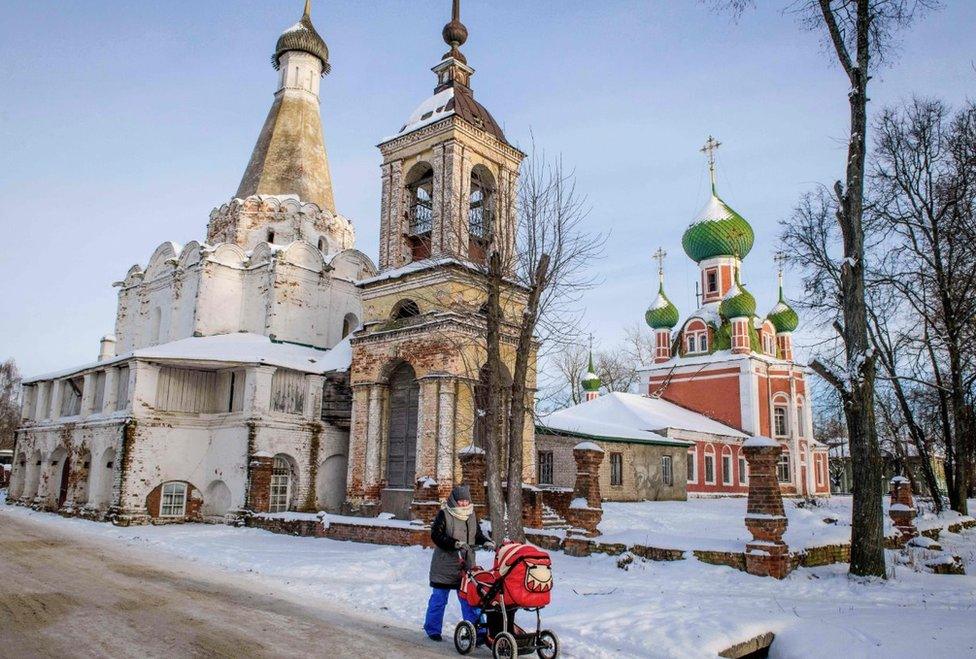
The world of Moscow politics is a world away from the picturesque town of Pereslavl
Further on is a sign for a lakeside surfing club, a hint at the town's evolving identity since Muscovite "downshifters" began moving 140km (87 miles) from Russia's capital.
On a Moscow salary, life in picturesque Pereslavl looks pretty good. But for those on local wages, glamping and health-food shops are an alien world.
So, it seems, are Moscow politics.
Is Putin planning for 'Pexit'?
A young man crossing the town's very own Red Square sets the mood.
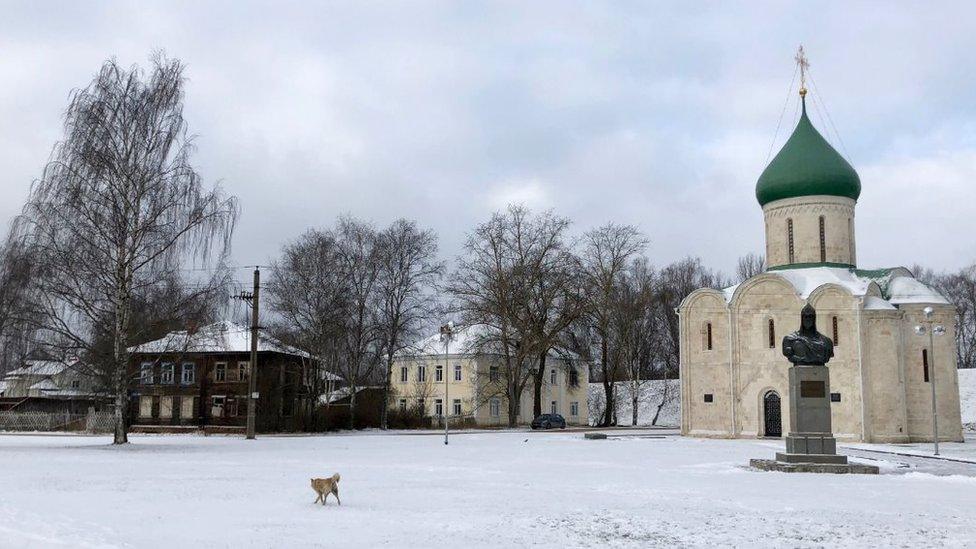
A dog walks across Red Square in Pereslavl
"I don't give a damn," he declares after listening politely to a question on President Putin's reforms, then trudges on across the snow.
The small crowd of parents outside School Number 1 are more forthcoming.
Most have heard about the welfare part of Mr Putin's State of the Nation address, including help for low-income families. But they paid little attention to the constitutional changes announced later in the speech.
The measures include a slight redistribution of powers between president, prime minister and parliament that's widely seen as Mr Putin's first step in planning for life post 2024 - or "Pexit".
"We saw that Putin promised more benefits for mothers and that's positive," Yulia says, as she waits for her son. The idea that the man already in charge for two decades might go on pulling the political strings doesn't trouble her.
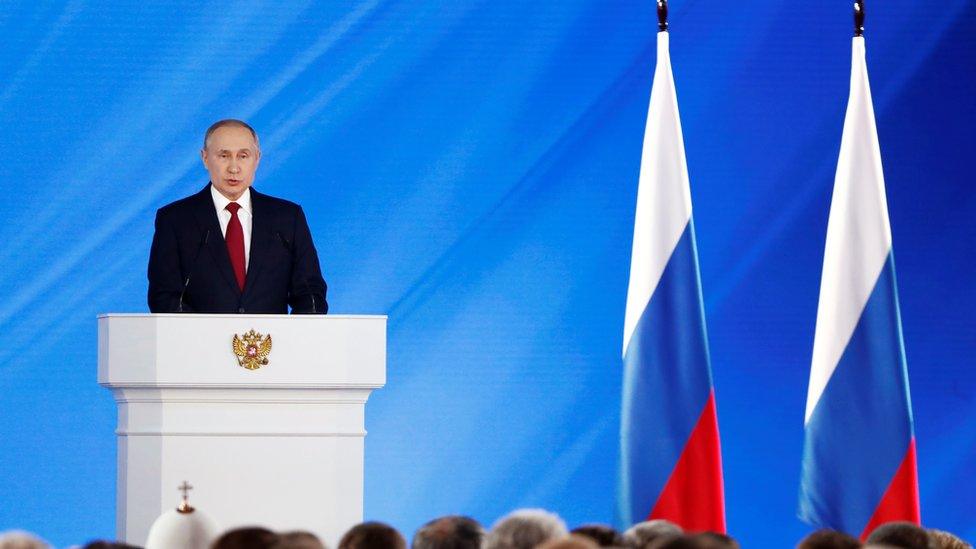
Much of Mr Putin's 15 January speech was given to welfare, but later he announced plans to change Russia's constitution
"I think he's a decent leader," the young mum shrugs. "But then, I don't know any other candidates."
Olga, standing with a pram, didn't clock the constitutional proposals at all: her TV's tuned to cartoons these days, not news shows.
"Is it time for a change after 20 years? Maybe," she ventures. "But things are stable, calm - and who knows what could happen in the future?"
Putin not the only story in town
It's no rejection, but it is less than fulsome praise for Vladimir Putin from the mums of Pereslavl.
That tallies with a gradual fall in his approval rating from once-giddy heights, mostly since 2018 when he hiked up the retirement age.
The president's address appears to acknowledge that, as he pledged to prioritise improving life for Russians at home. With elections to parliament due next year, and his own party increasingly unpopular, it's a significant switch.
It also looks like a sweetener ahead of any manoeuvring to maintain political influence.
Deputies at Pereslavl's town parliament seem as unfazed by that as those on the school run. A lively session of the budget committee is too concerned with tracing millions of missing roubles to worry about Mr Putin morphing into some kind of "Father of the Nation".
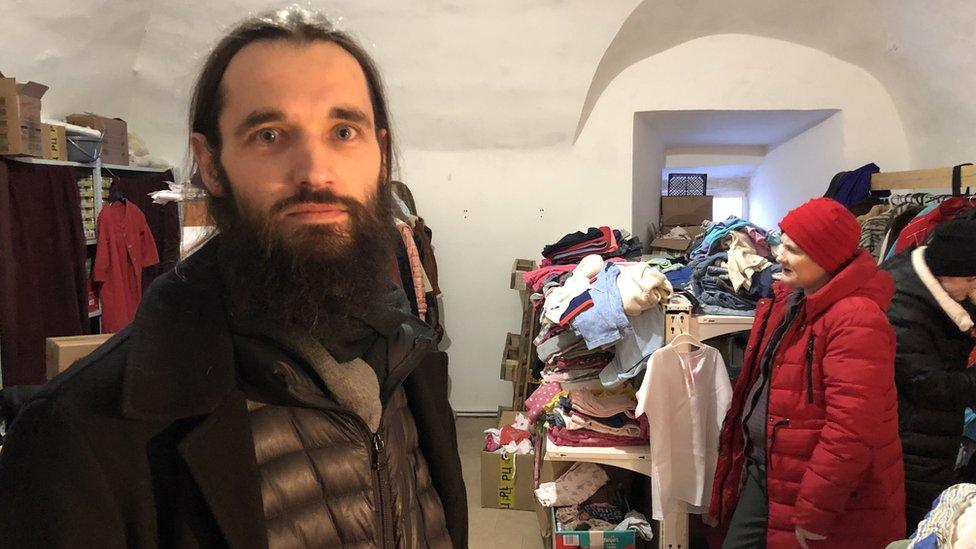
Fr Pantalaimon Korolev, the abbot at Holy Trinity-Danilov monastery, says children especially need support
There's a financial scandal over a summer camp to figure out, a new town plan that's way over schedule and a mysterious tennis court that no-one appears to own or use.
When the chairman does mention the State of the Nation speech, one deputy pronounces loudly that he "didn't listen to it at all".
Up at one of Pereslavl's multiple monasteries, some were paying attention - to the promise of "worthy" living standards.
"Many people who live here constantly need support," explains Pantalaimon Korolev, a chatty young monk who learned his English from Agatha Christie and computer games.
'There are a lot of people in the surrounding villages where there's almost no work. They need simple things, especially for the children,' Br Pantalaimon says.
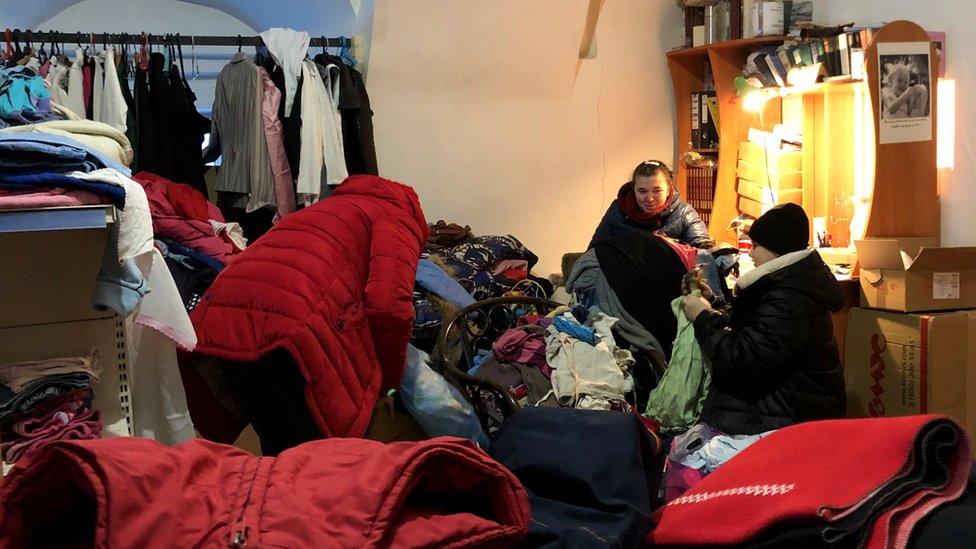
The monastery provides clothes to families in the area
So a few years back, he set aside some rooms at the Holy Trinity-Danilov monastery that are now piled high with donated clothes, food and children's toys.
'My husband used to get lots of work as a builder, but there's nothing now,' Maria explains, heavily pregnant with her third child and picking through the heaps of clothing for a good sweater.
Her mother has heard of Mr Putin's constitutional reform, though it's definitely not Nadezhda's priority.
"I used to follow the news but these days I mainly think how to get by," she confides.
Even so, she doesn't object to the idea of Mr Putin hanging around. "As president, he's fine," Nadezhda says.

Find out more about Putin's plans for Russia
Putin's plans: What the Russian president's surprise means
What Putin's plans mean: Sarah assesses the hints from the president's surprise shake-up
What is Russia's Putin up to?: "Mr Putin wants to remain in power, the question is how"

"The situation is so immediate, so very fast, that public opinion is disorientated," Kiril Rogov of the Liberal Mission Foundation believes.
He says the reforms are being enacted so inexplicably quickly, it's like a "special operation".
"People do not understand exactly what it's all about," he argues.
The same can be said of political analysts.
Why Putin is keeping it vague
Mr Rogov's own latest reading is that Vladimir Putin may yet stay on, somehow, in the Kremlin itself. He drew that conclusion after realising that the presidency would remain Russia's most powerful position, even after the amendments.
"Everybody believes Putin is going to participate in the political process and have some control. But we still don't know in what form, and how it will be," Kiril Rogov admits.
The confusion may be deliberate: a crude move to cling to power, like some Central Asian autocrat, would likely spark street protests. Keeping things vague leaves critics with little concrete to grasp.
As a result, opposition groups are as divided as the analysts. Even in Moscow, a protest pencilled in for next weekend has been abandoned.
Animating the public enough to turn out en masse for a planned vote on the reforms could well be a challenge for the Kremlin, seeking legitimacy.
But the people of Pereslavl certainly don't look likely to rise up in revolt.